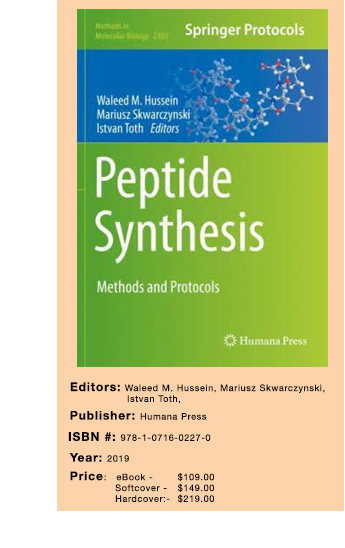
Book Reviews Peptide Synthesis Methods and Protocols Departments of Chemistry, University of Missouri Columbia, MO 65211 (E-mail: Hassan.Seyrani@mail.missouri.edu) |
||
The examined publication, "Peptide Synthesis Methods and Protocols," stands out in the scientific landscape, especially for chemists and researchers in the field of peptide chemistry. It's the 2103rd installment in the esteemed "Methods in Molecular Biology" series from Springer Protocol, under Humana's publication. The book, divided into 22 sections, takes a thorough look at various aspects of peptide synthesis. It covers everything from basic tests like the Kaiser test, checking if deprotection processes are done right, to advanced Microbioreactor Techniques for making and studying microbial peptides. Starting with fundamental peptide synthesis, it explores Biphalin as a case study in solution phase peptide synthesis. In the following chapters then dive into different methods like In Situ Neutralization Protocols, Protecting Groups in Peptide Synthesis, and Synthesis of Branched Peptides. These cater to a wide audience of peptide scientists. Meanwhile, specialized insights are offered with chapters on Microwave-Assisted Solid-Phase Synthesis and New Developments in Microwave-Assisted Solid Phase Peptide Synthesis, promising better results in less time. The book takes on a significant challenge in peptide synthesis – modifying peptides after synthesis, discussed in chapters like Synthesis of Amide Backbone-Modified Peptides and Decarboxylative Couplings for Late-Stage Peptide Modifications. Notable are chapters focusing on peptides as tools for studying diseases, like Peptidomimetic Synthesis: Drug Discovery for Alzheimer’s Disease, and Metal–Peptide Complexes to Study Neurodegenerative Diseases. In summary, the book, written with precision, serves as an excellent guide for laboratory practitioners. It's recommended for scientists with basic knowledge in peptides, looking to tackle modern challenges in this field. Whether you're exploring foundational concepts or advanced techniques, this publication is a valuable asset for researchers navigating the complexities of peptide synthesis.
|
||
